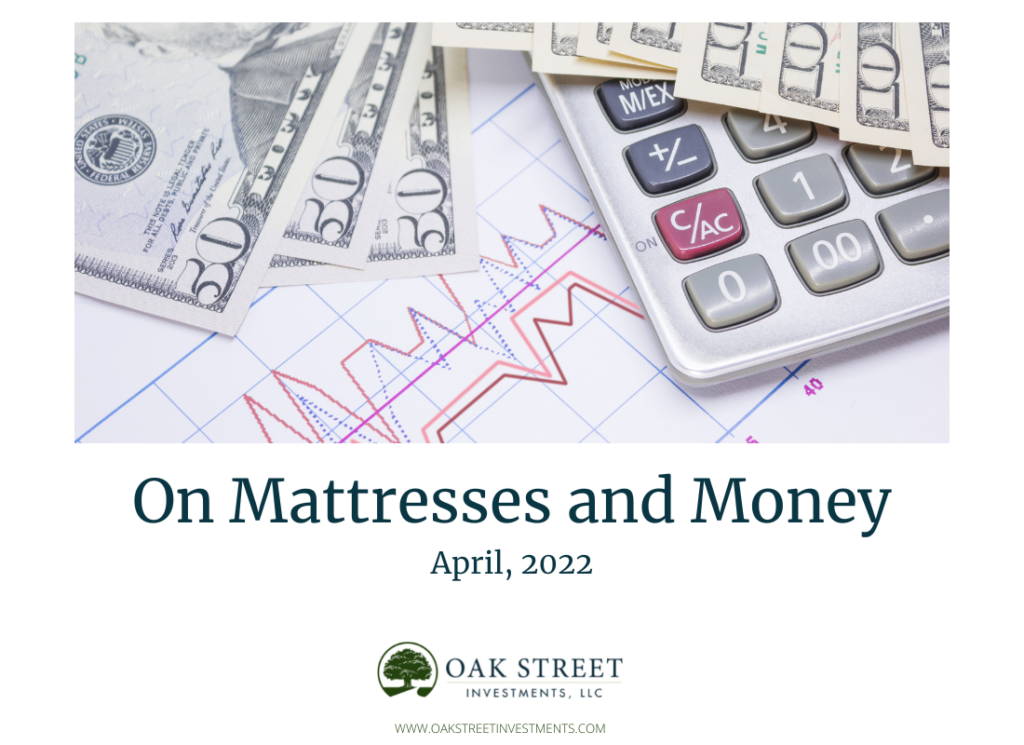
Predictions, Money and Mattresses
US and global bonds just finished their worst quarter on record – and the losses have continued into April. The Barclays Aggregate Bond Index, more commonly referred to as “The Agg” – a good proxy for the entire US Bond market, was down 5.93% at the end of Q1, and currently sits over 8% down from where it started the year. While there are areas of the fixed income market that have done worse – long term US Treasuries are down over 18% – some pockets have provided shelter, most notably bonds that are shorter in duration than the aggregate, or those intended to protect against inflation. So what’s a disciplined, long-term investor (perhaps you, dear reader?) to do? Is it time to bail on bonds (sorry, couldn’t help myself) or rebalance into the selloff, as is more common in the equity markets?
I don’t usually make short-term market guesses, or advise on short-term portfolio moves. My crystal ball has been in the shop for almost 20 years; at this point I can’t remember if it was a fogging issue or it was cracked. Additionally, I don’t trust the self-proclaimed experts since it seems the smartest people I know tend to be disproportionately wrong on their forecasts (truly, the inverse correlation between IQ and market performance is uncanny). That said, I’ll still toss my two cents (now worth substantially less) and three predictions into the jar. To be clear, I believe in the power of long-term markets, good diversification and poor performance as a result of short-term market prognosticating.
Prediction #1: I have a fairly high degree of confidence that the volatility seen in both the equity and bond markets will continue for the foreseeable future. The Federal Reserve has been clear in their intent to increase interest rates, slow inflation, and reduce the size of their balance sheet. While these actions will naturally slow the rate of economic growth, they will also probably reduce current asset prices – a mostly-unstated though well-known intent by the Fed. One way to get people to stop spending so frivolously is to take away (or reduce the size of) their piggy bank. As the saying goes, “don’t fight the Fed”.
Prediction #2: Get used to hearing the word stagflation, a cool-sounding word poor market-performer types (see above) use to talk about periods of low growth and high inflation. The problem with stagflation is that the remedy for high inflation, namely higher interest rates, is opposite of the cure for a slow economy, lowering interest rates. And I thought it was a difficult time to be a financial advisor, I’m grateful (and you should be too) that I’m not a Central Banker!
Prediction #3 and the answer to the question a few paragraphs up: what’s a disciplined investor to do? Well…not much; but before you write the editor, upset about spending your time reading the last few paragraphs, note that it’s not nothing. While I haven’t eliminated fixed income in my portfolios, I have slightly reduced the target long-term allocation. Note that this wasn’t done as a one week or month tactical move, but as a shift toward a longer-term rising interest rate environment – or until the hard-landing (read: recession) comes and interest rates come back down or spending slows enough to reduce inflation to rates under that of the federal reserve rate.
Less prediction, more general guidance? Investors should view their allocation to bonds as a buffer to (big) market sell-offs when the institutions flock to safety, and increasingly, as a source of income. Don’t abandon all bonds. Consider reducing duration and prepare for continued stock and bond volatility. Zoom out. Turn off the TV and focus on longer-term returns. Remember that market sell-offs present higher future expected returns and that market-highs present lower expected returns. Don’t let fear and greed (or any emotions) dictate your investment philosophy. Remember that enduring turbulent markets is the price you pay for expecting higher returns. Don’t want volatility or returns? Your mattress is calling.
Happy Easter, Passover and Tax-Day.

[…] last quarter’s newsletter I made three predictions: volatility would continue, growth would slow (recession) while […]